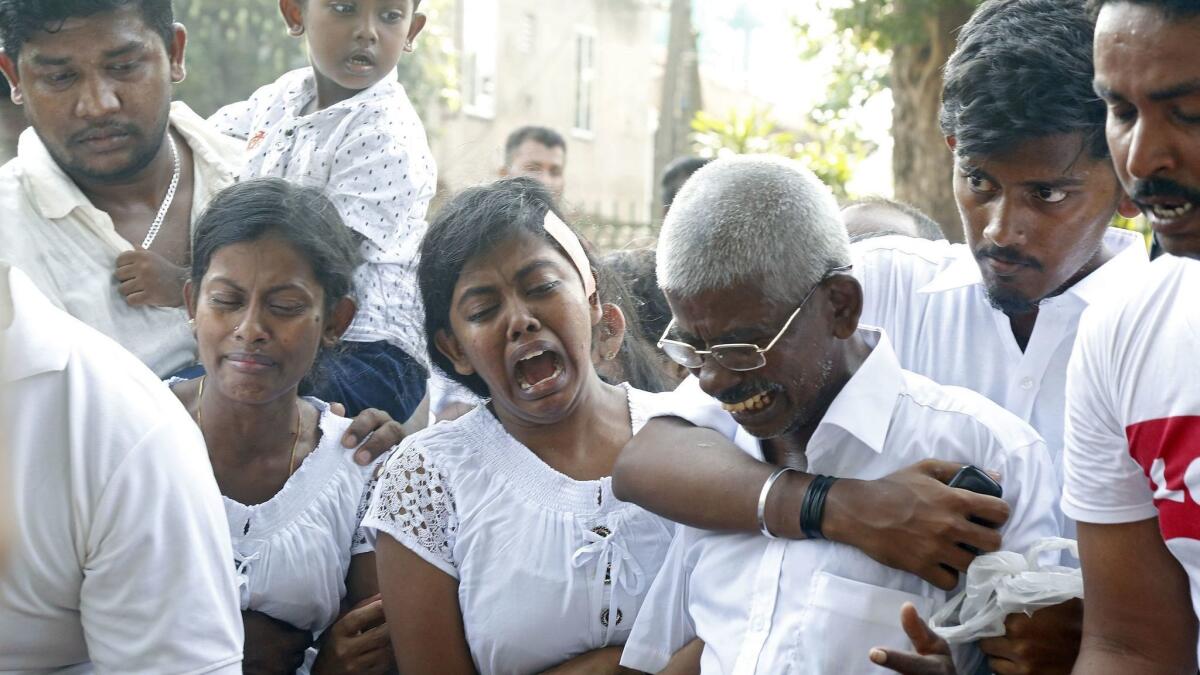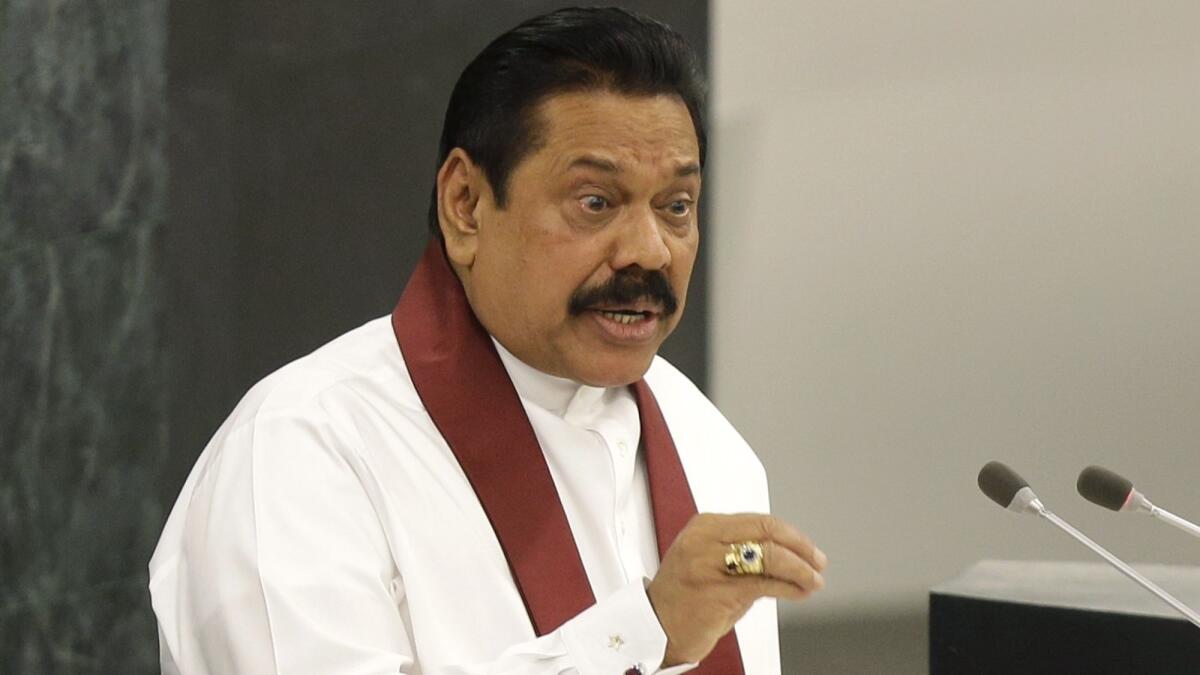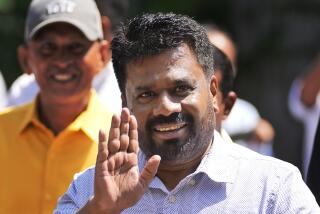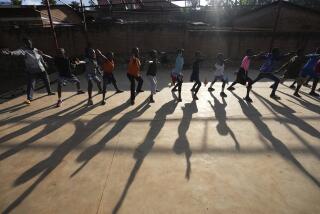As new details of Sri Lanka attackers emerge, survivors call for the return of a strongman

- Share via
Reporting from Negombo, Sri Lanka — The family was stunned, grieving — and angry. They had just buried three of their own, an elderly couple and their 11-year-old grandson who were killed in their church pews Easter morning, and they lashed out at the government.
“They destroyed our security,” said Ranjiv Silva, 45, the boy’s father, his voice shaking. “We can never forgive it.”
In their anguish, Silva and his family members voiced a sentiment heard often this week in the rain-soaked courtyards and freshly dug burial grounds of this largely Catholic town, site of the deadliest of the eight bombings across Sri Lanka on Sunday: It was better when former President Mahinda Rajapaksa was in charge.
The controversial former strongman, who squashed a three-decade insurgency by minority Tamil separatists before being ousted at the polls in 2015, is getting a reappraisal as the government that replaced his struggles in its response to the worst terrorist attack in the island nation’s recent history.
Authorities on Wednesday raised the death toll from the bombings targeting churches and hotels to 359, making it the deadliest attack ever claimed by Islamic State. A defense official also said there were nine suicide bombers — not seven, as initially believed — and that most were well-educated, some holding master’s degrees, and hailed from middle- or upper-middle-class families.
“That is very worrying,” the junior defense minister, Ruwan Wijewardena, told a news conference, adding that one bomber had studied in Britain and Australia before resettling in Sri Lanka. A small number of Sri Lankan Muslims are known to have traveled to Syria to fight alongside Islamic State, and authorities are investigating whether the attacks were directed, supported or merely inspired by the extremist group.
The bombers’ profiles mirrored those of the relatively well-to-do assailants who killed 23 hostages at an upscale cafe in the Bangladeshi capital of Dhaka in 2016 — another Islamic State-claimed attack that showed the reach of the extremist group’s ideology.
Wijewardena also said that investigators had revised their view of the involvement of National Thowheeth Jamaath, the obscure domestic fundamentalist group that the government had initially identified as responsible for the attacks. He said the bombers were now thought to be part of a splinter faction.
Their leader, Mohammed Zahran, was believed to be one of seven men who appeared in a video released by Islamic State, pledging allegiance to its leader, Abu Bakr Baghdadi. All seven men were suicide bombers, the group said.
Speaking in Parliament this week, Rajapaksa said “the government must resign” over the security lapse.
A leader of Sri Lanka’s ethnic Sinhala Buddhist majority, Rajapaksa and his family controlled the country for a decade, during which he was accused of war crimes and enforced disappearances, racked up large debts to China, abolished term limits and presided over the rise of increasingly violent Buddhist nationalist groups that often attacked ethnic and religious minorities.
He was unseated at the polls by a coalition led by Maithripala Sirisena, his former health minister, who campaigned to restore democratic norms, fight corruption and investigate alleged wartime atrocities against Tamil militants and civilians. He rallied the support of minority groups including Christians, who make up less than 10% of the country’s 21 million people.
In Negombo, a coastal Colombo suburb that is one of the few majority-Catholic towns in the country, Sirisena won two-thirds of the vote.
But Sirisena’s government has failed to keep any of its major promises. He barely speaks to his coalition partner, Prime Minister Ranil Wickremesinghe, whom he tried in vain to fire last year — and replace with Rajapaksa.
Now the relationship is under even greater scrutiny amid reports that Sirisena refused to share intelligence reports warning of a terrorist plot with Wickremesinghe or his Cabinet.
Sirisena has said that he was not aware of the intelligence. On Wednesday he asked the top police official and the defense secretary to resign.

Rajapaksa’s former army chief, Sarath Fonseka, who led government forces in the final phase of the civil war in 2009, blasted the government for its response to the attacks.
“A country that suffered for 32 years was rescued, but now we have witnessed the biggest carnage in our country which we didn’t even undergo when we had a war,” Fonseka told lawmakers Wednesday.
Human rights groups have long fought to have Rajapaksa, Fonseka and others held accountable for alleged war crimes, enforced disappearances and other atrocities inflicted on Tamil militants and civilians. In 2013, Rajapaksa used a speech at the United Nations General Assembly to lash out at Western countries and advocacy groups that he said were meddling in his small nation “in the guise of [protecting] human rights.”
But what many Sri Lankans remember now is that he decisively ended a long civil war that had decimated the economy and caused tens of thousands of deaths.
In 2017, his party won the most votes in local elections, and even before the attacks, analysts said his political machine was the favorite to win presidential elections due in the next 12 months. (With term limits reinstated, his younger brother Gotabaya, a former defense minister who some also accuse of war crimes, is seen as the likely presidential candidate.)
“This attack plays into their hands, particularly for Gotabaya, who would be running on a law-and-order, nationalistic platform that says don’t spend too much time thinking about human rights,” said Alan Keenan, Sri Lanka analyst for the International Crisis Group.
“I can’t see how they wouldn’t be the front-runners.”
Many Christians in Negombo describe Rajapaksa’s ruthless tactics in crushing the Tamil insurgents — who pioneered the use of suicide vests — as the type of take-no-prisoners approach Sri Lanka needs now..
“Under Mahinda Rajapaksa, maybe everything wasn’t good, but security was good. He got the [Tamil rebels] under control,” said Silva, 45, standing outside his house the afternoon following the burials, bandages plastered over his scalp and arm.
He, his wife and younger son were wounded when the bomber detonated his vest in the aisle of St. Sebastian’s church in Negombo. Sitting a few rows behind them, Silva’s 11-year-old son Enosh and his in-laws, 73-year-old Calistus Fernando and his wife, Manel, 69, were killed instantly.
“This current government couldn’t even control this small group” of bombers, Silva said. “They have opened the ground for terrorists to play.”
Bernard Perera, a 35-year-old entrepreneur, said Western countries had targeted the Rajapaksas unfairly.
“They tried to blame them over human rights issues, but the former president did the right thing,” he said. “He protected the country.”
Others said the attacks showed that promises of democratic rule were overrated.
“We want a dictator in this country,” said Joseph Fernando, a 63-year-old Catholic from the Colombo suburbs. “Mahinda Rajapaksa brought peace; he stopped a 30-year war. In his 10 years, we never had a problem like this.”
Special correspondent Mushtaq reported from Colombo, Sri Lanka.
More to Read
Sign up for Essential California
The most important California stories and recommendations in your inbox every morning.
You may occasionally receive promotional content from the Los Angeles Times.











